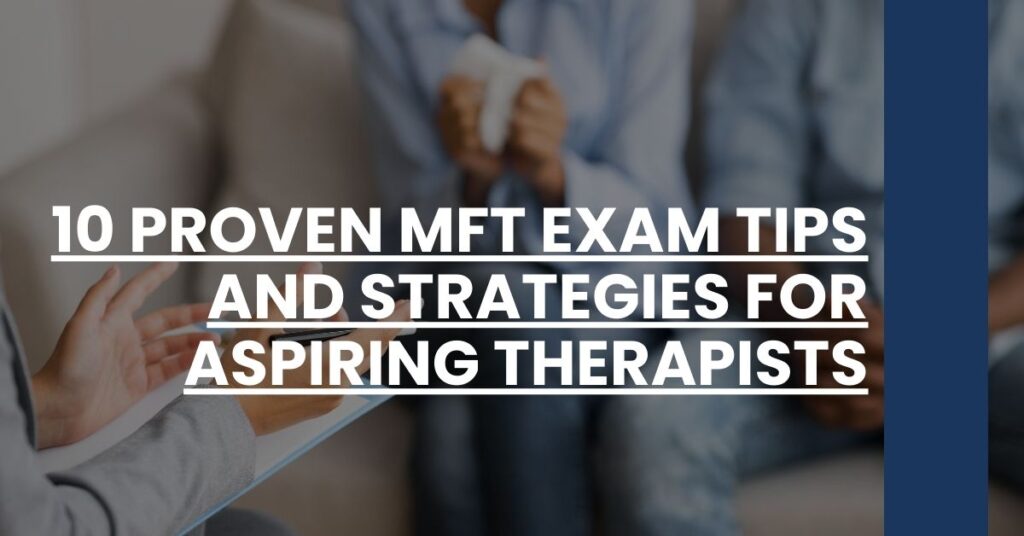Preparing for the MFT Exam? You’re likely seeking effective MFT Exam Tips and Strategies that will pave the way to your success.
This is not a one-size-fits-all study guide; instead, it’s a focused look at strategies that can truly elevate your exam performance. Our insights include crucial information tailor-made to fortify your understanding and sharpen your test-taking skills.
Get ready to tackle the MFT with confidence, equipped with the knowledge to excel.
- 1. Understand the MFT Exam Structure
- 2. Develop a Personalized Study Plan
- 3. Utilize Practice Tests Wisely
- 4. Master Key MFT Concepts
- 5. Focus on Your Weak Areas
- 6. Manage Exam-Day Stress
- 7. Optimize Your Study Environment
- 8. Engage with MFT Learning Communities
- 9. Prioritize Your Well-Being
- 10. Stay Informed on Exam Updates
- MFT Exam Eligibility
- Registration and Scheduling
- Test-Taking Strategies
- Additional Resources
- Conclusion
1. Understand the MFT Exam Structure
If you’re about to embark on the journey to become a licensed Marriage and Family Therapist (MFT), mastering the structure of the licensure exam is your foundation. The MFT National Examination, administered by the Association of Marital & Family Therapy Regulatory Boards, is a thorough assessment designed to gauge your readiness to practice. It’s crucial to start with a clear understanding of what you’re facing:
- Exam Format: The MFT Exam is comprised typically of 170 multiple-choice questions, with 150 of these counting towards your final score.
- Question Types: You will encounter scenario-based questions that require problem-solving skills, not just rote memorization. Be prepared for queries that span across treatment planning, ethical considerations, and diagnoses.
You may register for the exam with an Approval Code following the completion of academic and pre-professional requirements. The exam is not a surprise; it follows specific blueprints that outline the skill set you’re expected to have. So take a moment to familiarize yourself with the details to align your preparation effectively.
2. Develop a Personalized Study Plan
Creating a study plan tailored to your individual needs, strengths, and weaknesses is a pivotal MFT Exam Tip and Strategy. The MFT National Exam is not one-size-fits-all, and neither is your study plan. To craft the most effective strategy:
- Assess your existing knowledge: Where do you stand concerning MFT theories, practices, and ethical guidelines?
- Identify your timeline: When is your exam scheduled? Map out the time you have and set milestones along the way.
- Allocate study sessions: Intersperse intense study periods with shorter review sessions to reinforce learning while preventing burnout.
Personalized study resources like the ExamPrepConnect digital platform, which offers customizable plans and progress tracking, can help you remain on target. Remember, a personalized plan is your blueprint for success.
3. Utilize Practice Tests Wisely
Practice tests are more than just a rehearsal for the MFT Exam; they’re powerful tools for consolidating your learning. By integrating practice exams into your preparation, you simulate the pressure of the actual test which helps to strengthen your time management and problem-solving skills. However, use them judiciously:
- Early Integration: Begin with practice tests early to identify areas of strength and weakness.
- Review Incorrect Answers: Analyze the questions you answer incorrectly to turn weaknesses into strengths.
- Simulate Real Conditions: When you take a practice test, mimic the conditions of the real exam to improve your test-day performance.
Consider engaging with resources like the Therapist Development Center, which offers realistic practice questions complemented by support from coaches for an all-rounded prep experience.
4. Master Key MFT Concepts
To crack the MFT Exam, a granular understanding of essential concepts and theories is a must. These form the bedrock of the questions you’ll encounter. Here’s what to focus on:
- Major Theoretical Models: Ensure you have a strong grasp of different therapy models like cognitive-behavioral, systemic, and narrative approaches.
- Diagnostic Criteria: Familiarize yourself with the precise criteria for common psychological disorders.
- Legal and Ethical Issues: Knowledge of professional ethics, confidentiality, and legal responsibilities cannot be overstated.
Resources such as AATBS’s MFT Exam study materials can provide you with a detailed exploration of these critical topics, laying out terms, and concepts you need to know like breadcrumbs leading you to success.
5. Focus on Your Weak Areas
Succeeding in the MFT Exam requires a clear-eyed assessment of where you need to improve. It’s often tempting to keep revisiting the content you already know because it feels more comfortable. Instead:
- Target Deficiencies: After practice exams, zero in on the areas where you struggled.
- Make a Plan: Develop specific strategies for addressing these topics, whether it’s revisiting theory, additional practice scenarios, or seeking clarification on complex concepts.
- Regular Review: Keep revisiting these areas to track your progress.
By turning weaknesses into strengths, you’re building a more holistic understanding of the material, as illustrated by the thorough answer explanations offered by resources like Mometrix Academy.
6. Manage Exam-Day Stress
The day you sit for your MFT Exam can be fraught with anxiety. Effective stress management can make the difference between a clear mind and one clouded with worry. Therefore, invest time in learning these strategies:
- Relaxation Techniques: Practices like deep breathing, visualization, and mindfulness can help keep exam jitters at bay.
- Routine Maintenance: In the days leading up to the exam, maintain a consistent sleep schedule, eat healthily, and engage in light exercise.
- Preparation: Familiarize yourself with the exam center location, and have all necessary materials ready the day before.
Stress-management tools and techniques, such as those offered by the California MFT Clinical Exam prep course, not only prepare you for the exam content but also for the exam experience.
7. Optimize Your Study Environment
The environment where you study plays a significant role in your information retention and focus. Setting up a dedicated space free from distractions is invaluable. Here are some elements to consider:
- Quiet and Comfort: Choose a space that is quiet and where you can be comfortable for extended periods.
- Organization: Keep your study materials organized and readily accessible.
- Limit Distractions: Be mindful of digital distractions — consider apps or methods that help block out interruptions during study time.
It’s not just about what you study, but the environment in which you study that supports an effective learning process. A well-thought-out, optimized study environment that fosters concentration is a crucial part of your MFT Exam Tips and Strategies toolkit.
8. Engage with MFT Learning Communities
As you embark on your journey to pass the MFT Exam, remember that you are not alone. Engaging with learning communities can offer support and new perspectives that are invaluable. Here’s how you can leverage the collective wisdom of fellow MFT aspirants:
- Share Resources: Exchange study materials and tips on what’s been effective, which could reveal resources you haven’t yet discovered.
- Gain Different Perspectives: Discussing complex scenarios with peers can deepen your understanding and clarify concepts.
- Moral Support: It’s emotionally reassuring to connect with others who understand the pressures of the MFT Exam.
Platforms like Pacific Oaks College, highlight the richness of shared learning experiences, proving the adage that ‘two heads are better than one’. Integrating MFT Exam Tips and Strategies from a myriad of voices can significantly enhance your own preparation.
9. Prioritize Your Well-Being
Without a doubt, your mental and physical well-being is as crucial as your study regimen. Prioritizing your health can lead to more effective studying and, in turn, better exam performance. Here’s how you can take care of yourself during the MFT Exam prep:
- Regular Exercise: This isn’t just good for your body; it clears your mind and reduces stress.
- Adequate Sleep: Your brain needs time to rest and consolidate the information you’ve studied.
- Mindful Eating: Nutritious food fuels both your body and mind, keeping you alert and focused.
Remember, your goal should be to arrive at the exam station not just well-prepared academically but also in top physical and emotional condition. Balancing study with self-care ensures you’re prepared to perform your best.
10. Stay Informed on Exam Updates
Like any regulatory exam, changes and updates to the MFT Exam policies or format can occur, and staying abreast of such changes is essential. Here’s what you should do:
- Check Official Sources: Regularly visit the Association of Marital & Family Therapy Regulatory Boards for the most current information.
- Subscribe to Newsletters: They can keep you informed about changes to exam structures or important dates.
- Community Engagement: Insight from your learning community can alert you to updates you might have missed.
Staying informed means you won’t be caught off guard by any modifications that could affect how you study or take the exam.
MFT Exam Eligibility
Before diving deep into MFT Exam Tips and Strategies, ensure that you meet the eligibility criteria to sit for the MFT Exam. Familiarize yourself with the essential prerequisites:
- Academic Requirements: These usually include a graduate degree in marriage and family therapy or a related field.
- Supervised Experience: Accumulate the stipulated amount of clinical experience under a qualified supervisor.
Understanding the eligibility requirements is a foundational step in your preparation journey.
Registration and Scheduling
Knowing how to navigate the administrative aspects of exam preparation is as integral as the study itself. When you’re ready to schedule your MFT Exam:
- Obtain Approval: Secure the necessary approval from your regulating board or body.
- Choose a Date: Select an exam date that gives you sufficient time to prepare.
- Register Early: Early registration can relieve pressure and allow you to focus on preparation.
Taking these proactive steps can streamline the process, allowing you to direct your energy where it’s needed most: your exam preparation.
Test-Taking Strategies
Implementing effective test-taking strategies can enhance your chances of a good score on the MFT Exam. Consider these tactics:
- Read Carefully: Ensure you understand what each question is asking before answering.
- Manage Your Time: Keep track of the time and pace yourself to answer all questions.
- Educated Guesses: If unsure about an answer, eliminate clearly wrong options to increase your chances of a correct guess.
These strategies can bolster your confidence and improve your performance under test conditions.
Additional Resources
Supplement your primary study material with additional resources that offer diverse insights and practice opportunities. Here are some recommendations:
- Study Guides: They can provide a roadmap for your overall study strategy.
- Workshops: These can offer hands-on practice and interactive learning.
- Professional Coaching: Personalized coaching may help fine-tune your preparation plan.
Diversifying your study resources can enrich your preparation and expose you to a broader range of MFT Exam Tips and Strategies.
Conclusion
Armed with these proven MFT Exam Tips and Strategies, you are now equipped to tackle your preparation with increased confidence and a clear plan of action. Remember that success on the MFT Exam is not just about what you know—it’s also about how you prepare and how you manage yourself before and during the exam. Engage with the structured frameworks, study smart, and prioritize your well-being. Stay informed and connected, and use all available resources to their fullest potential. Your hard work, coupled with these strategic insights, will pave the way for a successful outcome. Go into your MFT Exam with confidence—you’ve got this!
MFT Exam Tips and Strategies to ace your Marriage and Family Therapy test. Expert advice, proven methods for successful preparation.

